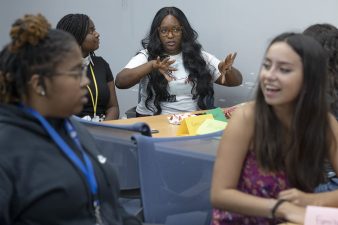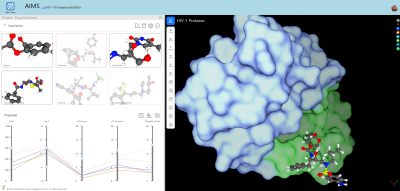Addictive Behaviors: A collaborative co-design program to promote health literacy and career awareness in high schools
-
Project Description
This project is relevant to public health because it directly addresses two opportunity gaps in biomedical science education that are particularly relevant to students from Historically Underrepresented Groups (HUGs – BIPOC, women, first generation college students and people from economically disadvantaged backgrounds) namely their need for the information and skills that allow them to make informed decisions about their health and that fosters their participation in the STEM+M workforce. This innovative three-phase program 1) integrates in-school instruction in the science underlying addiction with instruction in the high level competencies required for health literacy and participation in 21st century STEM+M careers; 2) provides teachers with comprehensive professional development to optimize implementation in the classroom and 3) performs a rigorous research study to evaluate the impacts of the curriculum on student self-efficacy toward seeking out health information and career awareness. Teaching the science behind addiction while helping students develop their scientific reasoning skills in the context of career awareness will therefore foster both health literacy and informed career choices.
-
Abstract
The combined medical and economic impacts of addictions currently cost the US over a trillion dollars annually; their social impact is incalculable. Whether we can mitigate these impacts depends on how successfully we educate a literate citizenry to understand how many different triggers elicit addictive behaviors because they all stimulate the same brain responses. Vulnerability peaks in the teen years, yet the skills needed to analyze and evaluate the risks related to these triggers are rarely addressed in high school biology classrooms, with the result that nearly half of US adults are ill prepared to make informed health decisions; historically underrepresented groups (HUGs) are most affected. The skills in understanding and evaluating the science behind health and disease are also needed to participate in STEM+M careers, so it is no surprise that the same communities are also disproportionately underrepresented in the STEM+M workforce. Our goal is to redress this balance by creating an engaging high school biology curriculum about the science behind addiction that dispels the stigma around substance use, in the context of key competencies required for both health literacy and career preparedness. The project builds on our extensive experience in high school health-science curriculum design and teacher professional development (PD). Our specialist co-design team includes scientists and teachers with experience in addiction and teaching students from HUGs. They will pose core questions – What triggers cause addictive behaviors? How do they stimulate the reward pathway? How does the reward pathway cause addiction? How can people prone to addictive behaviors be treated? and then deploy our novel, digitally supported, role-playing case-based pedagogy that promotes key competencies of data analysis and claims evaluation within a collaborative problem solving, career awareness framework. Successful implementation of novel curricula requires intensive teacher support. Our PD model prepares teachers via self-paced, graduate level, online learning and helps them teach via workshops that model strategies for enactment of novel pedagogies together with mentor-supported Just-In-Time problem solving as they are in the classroom. But students require self-efficacy (SE) to prime them for further action, whether changing health behavior or setting career goals. We will use 3 instruments we designed and validated in a well-matched comparison study to determine how effectively the curriculum fosters SE in health literacy and career awareness. Our approach meets the need for high-quality, integrated curricula designed for 21st century learners that helps students build the key competencies they need to make informed choices about their health and careers, while aligning with NIDA’s strategic plan to reduce stigma.





